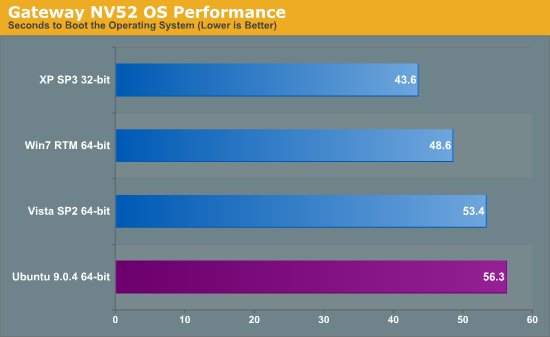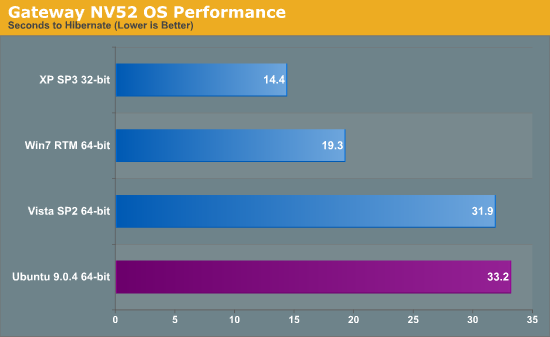Gateway NV52 (AMD) - OS Benchmarks
The final aspect of operating system performance we want to look at involves common OS tasks. We measure how long it takes to perform the routine operations of booting, shutting down, hibernating, resuming, suspending, and waking your computer using the four test operating systems. Unlike other test results, there was a huge degree of variability in some of the tests. We ran each test at least five times, and we took the best result - the reason being that some of the results were completely out of line with the average result, so including one or two results where the system took four times as long it didn't seem logical. Ubuntu and Windows 7 didn't show as much variation as XP and Vista, particularly in the sleep/wake testing, but the hibernate/resume test once again varies quite a bit between test runs.
The variability remained even after following a relatively straightforward test procedure. First we booted each laptop using the test OS (timing how long it took). Then we let the system stabilize for at least 15 minutes, with no extra applications running and the system sitting idle at the desktop. Finally, we performed one of the other tests - shut down, hibernate/resume, or sleep/wake. Obviously, you can't test resume time without first hibernating, and you can't test wake time without first putting the system to sleep, but otherwise we made sure to shut down the system between test runs.
We also need to mention that Windows XP has an inherent advantage in the hibernate/resume testing because we are using a 32-bit OS instead of a 64-bit OS. That means the system doesn't make use of all 4GB of memory, and the hibernation file is 3GB. Writing 3GB of data will obviously be easier than writing 4GB of data, especially when you're dealing with a 5400 RPM laptop hard drive.


The results are rather scattered this time, with certain functions favoring one OS and others looking better on a different OS. Boot times favor Windows XP, followed by Windows 7 which takes 11% longer. Vista trails Windows 7 by 10%, and Ubuntu brings up the rear at 5% longer than Vista. Shutdown times are a different matter, where Ubuntu takes the lead. Vista and Windows 7 are essentially tied, taking 55-60% longer to shut down than Ubuntu. Windows XP brings up the rear this time, at over 2.5 times as long as Ubuntu, although we have to say that this appears to be a driver issue as the result for the NV58 is radically different. When you shut down Windows XP on the NV52, there's a delay of about 15 seconds where there is no apparent activity, after which the hard drive activity light begins blinking. It would seem that without that handicap, Windows XP would be roughly the same as Vista and Windows 7.


As already stated, Windows XP 32-bit has an advantage for the hibernate/resume testing because it doesn't have as much addressable RAM. It ends up walking away with the hibernate/resume performance crown, followed by Windows 7. That said, the time to hibernate in Windows 7 is 34% longer than Windows XP and resume time is 32% longer; Win7 has 33% more memory, so a 32-bit version of Windows 7 ought to be as fast as Windows XP (or a 64-bit XP as slow as Win7). The gap between Windows 7 and Windows Vista is extremely large for hibernation time, with Vista taking 65% longer to hibernate and 46% longer to resume. Ubuntu is almost tied with Vista on the hibernation time, but it takes 50% longer to resume - about twice as long as Win7 - making it by far the slowest OS for this particular test.
We need to take a moment to discuss boot times and resume times, however, as there's more going on than meets the eye. When booting or resuming a system, the computer needs to perform a Power On Self Test (POST). That takes around nine seconds on these Gateway systems, and once that's complete the boot loader is activated which then loads the OS. Ubuntu uses GRUB and that appears to add an extra ~10 seconds relative to Windows. Without that time penalty, Ubuntu would be far more competitive in boot time (about equal to Win7), although it would still be in last place in the resume test. There are also laptops that have a fast boot feature so that they don't perform a lengthy POST, which can shave another 6 or 7 seconds off the boot/resume times. This is definitely a feature we would like to see implemented on more systems going forward, particularly laptops where users routinely boot or resume several times per day.


Wrapping up the OS performance analysis, the sleep/wake times were highly variable on the Windows XP and Vista operating systems. This is especially true if you put the system to sleep right after waking it up, booting, resuming, or any other complex task; in those cases, it might take over a minute to go back to sleep. Ouch! It may also take over 20 seconds for Windows to go to sleep if you have a bunch of applications open - that's about six times as long to put your laptop to sleep, which can be very annoying if you just want to pack up and go. You might think that you can just put your system to sleep and throw it in its bag and walk off, but sometimes a glitch will prevent a laptop from going to sleep so we like to make sure our laptops actually shut off before putting them in an enclosed space. We have heard of a few instances where a laptop has apparently overheated because it didn't go to sleep and a user put it in a laptop bag, resulting in a dead system. That's some food for thought anyway. Ubuntu and Windows 7 did a lot better, with the worst-case result being around twice as long as the best time.
Sleep times are a tie between Ubuntu, XP, and 7 at just under 5 seconds. Vista took noticeably longer even in our best-case result, trailing XP by 59%. Wake times mix things up quite a bit and show a lot less variation between runs, with Ubuntu falling to dead last and Vista and 7 essentially tied at ~3.5 seconds. XP takes 46% longer than Vista to wake and Ubuntu is 55% longer than XP (over twice as long as Win7). Again, though, variability in sleep times makes us prefer Windows 7 and Ubuntu followed by XP, with Vista being the worst at consistently going to sleep without a large delay.










106 Comments
View All Comments
Veerappan - Tuesday, September 22, 2009 - link
I'm not sure if it's possible at this point, but if you can, would it be possible to try out a copy of the 9.10 Alphas that are available? They should hopefully fix some of the intel driver regressions.Also, as an FYI/diagnostic, there's a CPU speed applet that is available in Gnome. Right click the top panel, select 'add to panel', and then somewhere there's a cpu speed monitor. That can be used to see if SpeedStep/Cool'n'Quiet are working correctly. You can even take it a step further, and change the permissions of the applet to allow you to change which CPU speed governor is active if you find that the CPU is running at full speed constantly.
lyeoh - Tuesday, September 22, 2009 - link
By the way, you should not use external sites during your test. The fact that you said "perhaps a Flash ad server was temporarily down" means you are doing it wrong.Different flash ads could be very different in CPU usage.
What you should do is snapshot/save the complete pages loaded from the websites you want, put them on a standardized webserver under your control, and then get the browsers to load the pages from that webserver. Disconnect the test network from the internet to prove that the page loads up fine without requiring external connections (css etc). You may need to include a test DNS server that fakes the replies, or stick to using IP addresses to access the test pages e.g. http://10.5.5.1/site1/testpage1.html">http://10.5.5.1/site1/testpage1.html http://10.5.5.1/site2/testpage1.html">http://10.5.5.1/site2/testpage1.html http://10.5.5.1/site3/testpage1.html">http://10.5.5.1/site3/testpage1.html
Once you have standardized on a set of pages, this means you don't have to redo the tests on all computers weeks/months later when you have another laptop to test. You only need to test the new device - since the pages are the same. Don't change the webserver too much either (but given the low loads it's unlikely to affect things much - unless it's really really slow).
JarredWalton - Tuesday, September 22, 2009 - link
Already in progress, after my round two Internet testing still proved too variable. As noted elsewhere, though, I want the content to be as close to realistic as possible. Law of averages says that most of the ads will balance out. It's also possible my home wireless phone knocked out my home WiFi a few times, which would mean several minutes (more?) of non-traffic. Many times I'm not around while letting the battery drain, since that's a bit of a waste of time.I need a new home phone for sure, though. The 2.4GHz model I bought several years back wreaks havoc on my 802.11n network.
strikeback03 - Wednesday, September 23, 2009 - link
You need a home phone at all?JarredWalton - Wednesday, September 23, 2009 - link
Babysitters might need something to call us, yeah. Could leave a cell with them I suppose, but I also use it for business/fax.7Enigma - Wednesday, September 23, 2009 - link
I highly recommend the Uniden DECT6.0 models. The kit I got about 6 months ago to replace crappy old units was ~$110 for 3 units. Additional units (if your manion requires :) can be added easily to the setup for another $30-40. No wireless issues whatsoever. And it's the first phone I've been able to use out to my curb without issues (brick exterior with plaster walls = bad signal). The only gripe I have is there doesn't appear to be a way to change the caller ID name when it comes in. You can program your own numbers in, but when you receive a call it always shows only how caller ID recognizes it.Got mine from the egg.
mschira - Monday, September 21, 2009 - link
on my Atom based laptop. Flash is mostly used for annoying advertising. And it eats CPU, makes the budy slow.Booo to flash...
M.
dnd728 - Tuesday, September 22, 2009 - link
If Adobe merely added a button to freeze all Flash animations or even just freeze all Flash in non-active tabs, then like a hundred power plants could have been scraped…JarredWalton - Tuesday, September 22, 2009 - link
Which is what FlashBlock does. :) Of course, Linux browsers by default don't normally auto-play Flash I don't think. I enabled that with Firefox and then used FlashBlock to stop it, just for an "apples-to-unoptimized-apples" comparison to Vista.bigboxes - Monday, September 21, 2009 - link
Whatever. I use adblock plus and see few ads. Flash, however, is a part of how we view the internet. It's a part of our experience. If you want a text only internet please feel free to step back in the wayback machine to 1988.